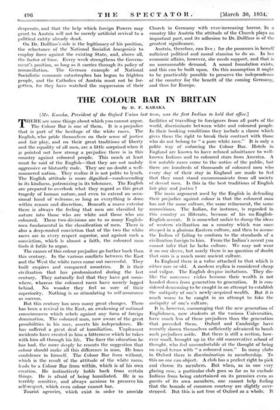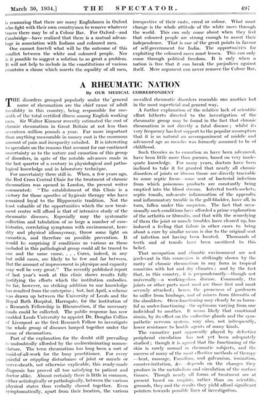THE COLOUR BAR IN BRITAIN
By D. F. KARAKA
[Mr. Karaka, President of the Oxford Union last term, was the first Indian to hold that office.] THERE arc some things about which you cannot argue. The Colour Bar is one of them. It is a prejudice that is part of the heritage of the white races. The English, who pride themselves on their sense of justice and fair play, and on their great traditions of liberty and the equality of all men, are a little surprised when it is pointed out how strong a prejudice there is in this country against coloured people. This much at least must be said of the English—that they are not unduly aggressive or blatantly rude. They are no doubt a well- mannered nation. They realize it is not polite to lynch. The English attitude is more dignified—condescending in its kindness, patronizing in its tolerance. The English are prepared to overlook what they regard as this great tragedy of human nature, and even to extend an occa- sional hand of welcome, so long as everything is done within reason and discretion. Beneath a suave exterior there is always the feeling that men are classified by nature into those who are white and those who are coloured. These two divisions are to so many English- men fundamental in the classification of men. There is also a deep-rooted conviction that of the two the white races are in every respect superior, and against such a conviction, which is almost a faith, the coloured man finds it futile to argue.
The causes of this colour prejudice go further back than this century. In the various conflicts between the East and the West the white races came out successful. They built empires and conquered .countries. It is their civilization that has predominated during the last century. They naturally feel that they have got some- where, whereas the coloured races have merely lagged behind. No wonder they feel so sure of . their superiority. Nothing is so stimulating to self-assurance as success.
But this century has seen many great changes. There has been a revival in the East, an awakening of national consciousness which rebels against any form of foreign domination. The coloured man, now aware of the great possibilities in his race, asserts his independence. He has suffered a great deal of humiliation. Unpleasant incidents have created in him a bitterness which he takes with him all through his life. The finer the education he has had, the more deeply he resents the suggestion that colour should make all this difference in man. He loses confidence in himself. The Colour Bar from without, which is the result of the attitude of the white races, leads to a Colour Bar from within, which is of his own creation. He instinctively holds back from certain things. He is afraid of being humiliated. He is so terribly sensitive, and always anxious to preserve his self-respect, which even colour cannot bar.
Tourist agencies, which exist in order to nroVide facilities of travelling to foreigners from all parts of the world, discriminate between white and coloured people. In their booking conditions they include a clause which gives them the right to break their contract with those who do not belong to k` a pure white race." It is only a polite way of enforcing the Colour Bar. Hotels in England are known to have refused admittance to Well- known Indians and to coloured stars from America. A few notable cases come to the notice of the public, but there arc hundreds of thousands of coloured men who every day of their stay in England are made to feel that they must stand excommunicate from all society of decent men. Is this in the best traditions of English fair play and justice ?
The main argument used by the English in defending their prejudice against colour is that the coloured man has not the same culture, the same refinement, the same mannerisms. The Indian, for instance, is regarded in this country as illiterate, because of his un-English- English.accent. It is somewhat unfair to dump the ideas of western civilization on a country which was once steeped in a glorious Eastern culture, and then to accuse the Indian of failing to conform to the standards of a civilization foreign to him. From the Indian's accent you cannot infer that he lacks culture. We may not wear it on our sleeve, but surely there is no question of doubt that ours is a much more ancient culture.
In England there is a value attached to that Which is either rare or old. A modern replica is considered cheap and vulgar. The English des pise imitations. They dis- like the nouveaux riches because their wealth is not handed down from generation to generation. It is con- sidered demeaning to be caught in an attempt to establish the antiquity of one's newly-acquired wealth: But it is much worse to be caught in an - attempt to fake the antiquity of one's culture.
It is, however, encouraging that the new generation of Englishmen, now students at the various Universities, have much less of these 'prejudices than the generation that preceded them. Oxford and Cainbridge have recently shown themselves sufficiently advanced to brush such prejudices aside. But there is still a section, how- ever small, brought up in the old conservative school of thought, who feel uncomfortable at the thought of being on equal terms with a coloured man." In many clubs in Oxford there is discrimination in membership. To this no one can object. A Club has a perfect right to pick and choose its members. But when, as in one very glaring case, a particular club goes so far as to exclude Indians from being entertained on its premiSes even as guests of its own members; one cannot help feeling that the bounds of Common courtesy are slightly over- stepped. But this is not true of Oxford as a whole. • • It is reassuring that there are many Englishmen in Oxford who fight with their own countrymen to remove whatever traces there may be of a Colour Bar. For Oxford-and Cambridge—have realized that there is a mutual advan- tage in association with Indians and coloured men.
One cannot foretell what will be the outcome of this conflict between the white and coloured people. Nor is it possible to suggest a solution to so great a problem. It will not help to include in the constitutions of various countries a- clause which asserts the equality of all men, irrespective of their caste, creed or colour. What must change is the whole attitude of the white races through the world. This can only come about when they feel that coloured people are strong enough to assert their independence. That is one of the great points in favour of self-government for India. The opportunities for exploiting the coloured races must lessen. This can only come through political freedom. It is only when a nation is free that it can break the prejudices against itself. Mere argument can never remove the Colour Bar.









































 Previous page
Previous page